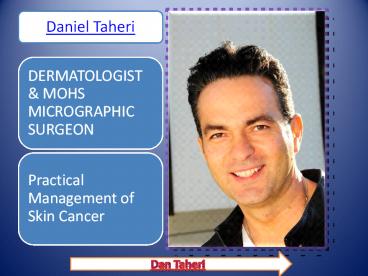Daniel Taheri - PowerPoint PPT Presentation
Title:
Daniel Taheri
Description:
Dr. Daniel Taheri , selected as the best dermatologist in Los Angeles by Los Angeles Magazine, is one of the most recognizable names in the field of dermatology. As his credentials will show, he has been a pioneer in laser surgery, performing more laser procedures than any other center in Southern California. – PowerPoint PPT presentation
Number of Views:59
Title: Daniel Taheri
1
Dan Taheri
2
Daniel Taheri M.D. is a graduate of the UCLA
School of Medicine where he was awarded the
"Valentine Honor" the most prestigious award
bestowed upon a UCLA Medical School Graduate. Dr.
Taheri went on to complete his residency at UCSD
Medical Center and is board certified by the
American Board of Dermatology. Throughout his
career, Dr. Taheri has published over 25 articles
in various Scientific Journals and has authored
the book, "Practical Management of Skin Cancer"
which is used in Medical Schools around the
country. Link to Amazon.com. Dermatologist to
the Oscars Dr. Taheri is a nationally recognized
speaker/faculty for Botox cosmetic and a number
of laser companies. He has taught numerous other
physicians on the proper use of Botox and lasers
throughout the country. Multiple awards have been
presented for his outstanding achievements in
dermatological research. Dr. Taheri uses his
expertise to teach courses in Dermatology and
cutaneous surgery at UCLA affiliated hospitals.
He has also served as Dermatologist of the Stars
at the Academy Awards. Dr. Taheri, selected as
the best dermatologist in Los Angeles by Los
Angeles Magazine, is one of the most recognizable
names in the field of dermatology. As his
credentials will show, he has been a pioneer in
laser surgery, performing more laser procedures
than any other center in Southern California. He
is also one of the most experienced skin cancer
surgeons in the U.S., having performed thousands
of Mohs micrographic skin cancer surgeries.
3
Practical Management of Skin Cancer
- Featuring more than 200 full-color illustrations,
this highly practical volume provides detailed
guidelines for diagnosing and treating various
skin cancers. Particular emphasis is on the more
common forms of premalignant and malignant
lesions, including actinic keratosis, Bowen
disease, basal cell carcinoma, squamous cell
carcinoma, and melanoma and its subtypes. For
each type of cancer, the authors provide complete
information on clinical features, pathogenesis,
histopathology, diagnosis, treatment, follow-up,
and prognosis. The book describes a variety of
diagnostic methods, including shave biopsy and
punch biopsy, and discusses all available
treatments, including micrographic surgery,
electrodesiccation and curettage, surgical
excision, cryosurgery, intralesional therapy, and
radiation. Close attention is given to surgical
anatomy, proper use of surgical instruments,
suturing techniques, postoperative wound care,
common complications, and hazardous pitfalls.































